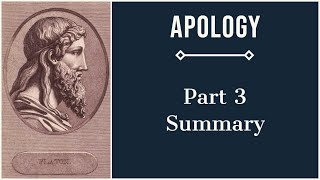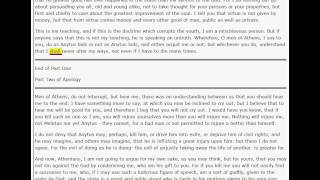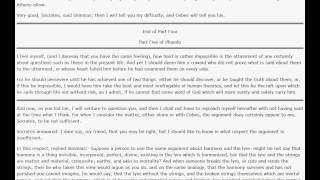Monday, 19 January, 2026г.
















Где искать: по сайтам Запорожской области, статьи, видео ролики
пример: покупка автомобиля в Запорожье
Apology Part 3 Summary | Defense of the Philosophical Life
Socrates defends his practice of philosophy. Summary of part 3 of Plato's Apology (28b-31c)
Plato's Apology playlist: https://www.youtube.com/playlist?list=PLPCGA67J8M2K4ewEQO0sB2B4O4HDxNQyx
0:12 Review of Part 2 & context for the Part 3 speech
0:51 Should he be ashamed of himself?
1:22 Compares philosophical mission to his military service
1:42 Rejects conditional acquital
2:02 Socrates' mission summarized
2:18 A bad man cannot harm a good man
2:43 Gadfly image
#Plato #Socrates #Apology
Music: Among the Clouds, by Darren Curtis
Thumbnail Image: Plato. By Unknown - https://www.bildarchivaustria.at/Pages/ImageDetail.aspx?p_iBildID=8939684, Public Domain, https://commons.wikimedia.org/w/index.php?curid=74323586
Images:
Clown. By Rick Dikeman at the English language Wikipedia, CC BY-SA 3.0, https://commons.wikimedia.org/w/index.php?curid=164188
2007 Socrates on Trial Playbill. By This poster was created by Joan Bryans of Vital Spark Theatre. - Sent via email, CC BY-SA 3.0, https://commons.wikimedia.org/w/index.php?curid=25567516
Detail View of Lucanian Red-Figure Bell-Krater, ca. 5th century BCE depicting the battle of Achilles and Penthesileia. The original photograph was taken by Marie-Lan Nguyen (User:Jastrow), 2008-05-02. This version of the image has been edited to reduce the glare and cropped to focus on the image of Achilles. By Unknown Red-Figure Vase Painter - https://commons.wikimedia.org/wiki/File:Bell-krater_Akhilleus_Penthesileia_MAN.jpg, CC BY-SA 2.5, https://commons.wikimedia.org/w/index.php?curid=56812696
Przyszowice recto: Slazakom Deportowanym Poleglym W ZSRR Rodziny Spolec[illegible]stwo 19[illegible] [Silesian deportees who died in the USSR.] By myself (User:Piotrus) - Own work (taken by myself), CC BY-SA 3.0, https://commons.wikimedia.org/w/index.php?curid=3243799
Gadfly on fabric in Rohkunborri National Park, Troms, Norway. By Bjørn Christian Tørrissen - Own work by uploader, http://bjornfree.com/galleries.html, CC BY-SA 3.0, https://commons.wikimedia.org/w/index.php?curid=16854591
Plato. By Unknown - https://www.bildarchivaustria.at/Pages/ImageDetail.aspx?p_iBildID=8939684, Public Domain, https://commons.wikimedia.org/w/index.php?curid=74323586
Transcript:
Hello, I’m Dr. Anadale. In this video I will go over the main content of Part 3 of Plato’s Apology.
In Part 2, Socrates cross-examined his accuser Meletus, and showed the jury the contradictions in the accusations he made. He dismisses Meletus as an intellectually unserious young man who is wasting the court’s time. Part 2 ends with Socrates saying that the true threat to his life comes not from the later accusers, but from popular resentment of his philosophizing.
In Part 3, Socrates defends the philosophical life he has lived for the past decades, questioning people in the public streets and marketplaces of Athens. He begins by addressing the question of whether he should be ashamed of living his life in such a way that he is now in court at age 70, on trial for his life. Definitely not, he answers. When deciding what to do, a good man, he says, should only consider what is right and wrong, not what danger is likely to follow. He compares himself to the heroes of the Trojan War, including Achilles, who chose to avenge Patroclus, even though it would mean his own death.
Socrates also reminds the jury of his courage while serving in the army during the Peloponnesian War. Just as he would not flee from a post his general had ordered him to hold, he will not flee from the mission of searching for wisdom in Athens, and helping people discover they are not wise.
He rejects the possibility of a conditional acquittal. If the jury were to offer to spare his life, on his promise to stop questioning others, he says, “I shall obey the god rather than you,” and continue encouraging his fellow citizens to examine their lives and turn toward virtue. Socrates then sums up his teaching. He says his only mission in life is to persuade everyone, young and old, to think less of their wealth and property, and assign highest priority to improving their souls.
In an important passage, Socrates insists that Meletus cannot injure him, because the gods to not permit a bad man to injure a god man. A bad man may perhaps kill a good man, says Socrates, or exile him, or imprison him, but these are not great injuries at all. Please think about what Socrates means by this; we will discuss it later.
At the end of Part 3, Socrates compares himself to a gadfly, a stinging horsefly, sent by the gods to sting and annoy the powerful but lazy horse that is the city of Athens. Although he is irritating, he is doing good and necessary work, and he suggests that the Athenians spare his life for their own sakes, because of the benefit he brings the city.
That wraps up Part 3 of the Apology. We will turn to Part 4 next. Goodbye.
Теги:
Plato Socrates philosophy Socrates defense Socrates trial Apology explained Socrates Meletus Apology summarized Apology summary Apology Socrates court Apology overview Platos Apology Socrates Apology of Socrates
Похожие видео
Мой аккаунт


 У вашего броузера проблема в совместимости с HTML5
У вашего броузера проблема в совместимости с HTML5


